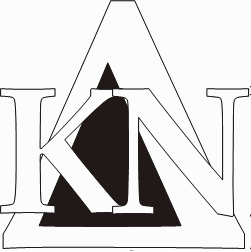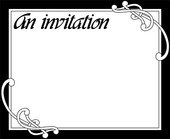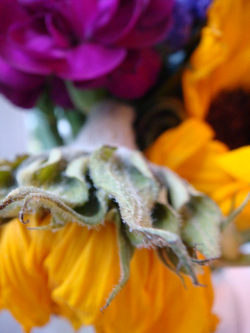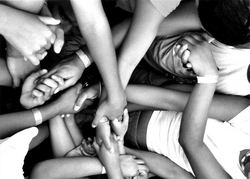|
5/10/2023 0 Comments Spring Fling IdeasHere are three creative ideas for Delta Kappa Nu chapters to celebrate "Spring Fling":
0 Comments
While kindness and niceness often overlap, there are indeed situations where acts of kindness may not necessarily align with traditional notions of being "nice." Here are some ways to show kindness that might challenge the boundaries of niceness: Setting Boundaries: Kindness sometimes means setting boundaries to prioritize your well-being and mental health. It may involve saying "no" to excessive demands or responsibilities that overwhelm you, even if it disappoints others. By taking care of yourself, you can show up more authentically and be of greater help when it truly matters. Honest Feedback: Kindness can involve providing constructive criticism or honest feedback to help someone grow and improve. While it may not always be pleasant to deliver or receive, offering genuine guidance and support can be an act of kindness that helps individuals develop their skills and achieve their goals. Challenging Injustice: Kindness extends beyond being polite; it involves standing up against injustice, discrimination, or harmful behaviours. Sometimes, being kind means having difficult conversations, advocating for marginalized voices, and promoting equality. It may require stepping out of one's comfort zone to address uncomfortable truths and work towards positive change. Tough Love: Kindness is not always about providing immediate comfort. At times, it means showing tough love and holding someone accountable for their actions. This approach involves setting firm boundaries and encouraging personal responsibility to foster growth and resilience. Active Listening: Kindness goes beyond merely hearing others; it involves active listening with empathy and without judgment. Sometimes, being truly present for someone means creating a safe space for them to express their emotions, even if it means facing uncomfortable truths or difficult conversations. Self-Reflection and Growth: Kindness begins within ourselves. Engaging in self-reflection, acknowledging our own flaws and biases, and committing to personal growth are acts of kindness that enable us to show up better for others and contribute positively to society. Remember, kindness is a multifaceted concept that may require stepping out of the comfort zone of being "nice." It prioritizes authentic care, empathy, and the long-term well-being of individuals and communities. By embracing these acts of kindness, we can make a more profound and lasting impact on the world around us and strengthen our bonds together. 17/7/2023 0 Comments Developing Key Skills for Empowering Leadership in Social Justice and PhilanthropyEngaging in a comprehensive program on leadership, social justice, and philanthropy can equip individuals with a range of essential skills needed to create positive change and improve the lives of marginalized communities. This article explores the key skills that participants can acquire through such a program, highlighting their importance and potential impact. WE are looking at these ideas as we develop our leadership program for members to progress through. Some of the key outcomes we would like sisters who undertake this challenge are outlined below.
Empathy and Cultural Competence: Understanding the experiences and perspectives of marginalized communities requires empathy and cultural competence. Participants learn to listen actively, develop an empathetic mindset, and engage in cross-cultural communication. These skills enable leaders to bridge gaps, foster inclusivity, and ensure that the voices of marginalized communities are heard and respected. Ethical Leadership and Responsible Philanthropy: Ethical leadership principles and responsible philanthropy practices are integral to making a meaningful and sustainable impact. Participants delve into case studies and engage in discussions that explore the ethical considerations and responsibilities of leaders and philanthropists. They learn to navigate potential pitfalls, uphold integrity, and make strategic decisions that prioritize the well-being of marginalized communities. Collaborative and Inclusive Approaches: Leadership for social justice requires collaboration and inclusive approaches. Participants develop skills in fostering collaboration, building partnerships, and leveraging diverse perspectives. They gain an appreciation for the power of collective action, learn to create inclusive spaces, and engage in cross-sector collaborations to maximize their impact. Grassroots Mobilization and Community Organizing: Grassroots movements have historically played a significant role in effecting social change. Participants acquire skills in grassroots mobilization, community organizing, and advocacy. They learn to build relationships, empower community members, mobilize resources, and create platforms for marginalized voices to be heard. These skills enable leaders to initiate and sustain grassroots movements that address systemic injustices. Strategic Thinking and Decision-Making: Leaders in social justice and philanthropy need strong strategic thinking and decision-making skills. Participants engage in exercises and simulations that hone their ability to analyse complex situations, think critically, and develop innovative solutions. They learn to navigate challenges, identify opportunities, and make informed decisions that advance the interests of marginalized communities. Communication and Storytelling: Effective communication and storytelling are powerful tools for driving social change. Participants develop skills in crafting compelling narratives, delivering persuasive messages, and engaging diverse audiences. They learn to communicate the stories and experiences of marginalized communities in a way that inspires empathy, raises awareness, and mobilizes support for their causes. Action Planning and Implementation: Turning ideas into tangible outcomes requires effective action planning and implementation. Participants learn to set goals, develop action plans, and implement projects that address the specific needs of marginalized communities. They gain skills in project management, resource mobilization, and measurement and evaluation to ensure that their efforts create sustainable and impactful change. Reflection and Continuous Learning: Leaders committed to social justice and philanthropy must engage in ongoing reflection and continuous learning. Participants are encouraged to reflect on their experiences, challenge their assumptions, and adapt their approaches based on feedback and new insights. They develop a growth mindset, seek out learning opportunities, and commit to a lifelong journey of improving their leadership skills and knowledge. A comprehensive program on leadership, social justice, and philanthropy equips participants with a diverse set of skills necessary for empowering marginalized communities and driving positive change. From empathy and cultural competence to strategic thinking and decision-making, these skills enable leaders to navigate complex challenges, engage in inclusive practices, and create sustainable impact. By cultivating these key skills, individuals become catalysts for social justice, driving meaningful change and improving the lives of marginalized communities around the world.  In our pursuit of personal growth and harmonious relationships, we often come across the words "nice" and "kind." At first glance, these terms may seem interchangeable, but upon closer examination, we discover a significant distinction between them. In this article, we will explore the profound difference between being nice and being kind, and how embracing kindness can transform our lives and the lives of those around us. Niceness: A Surface-Level Interaction Niceness is often associated with polite behaviour, superficial pleasantries, and a desire to avoid conflict at all costs. It involves being agreeable, compliant, and seeking approval from others. While niceness can create a pleasant atmosphere momentarily, it is a surface-level interaction that may lack authenticity and fail to address the deeper needs of individuals. Niceness can sometimes stem from fear—fear of rejection, judgment, or not meeting societal expectations. It can result in people-pleasing tendencies, where individuals compromise their own values and well-being to gain approval or avoid confrontation. While there is value in being polite and respectful, relying solely on niceness may prevent us from fostering genuine connections and making a meaningful impact. Kindness: A Compassionate Force for Change Kindness, on the other hand, emerges from a place of genuine care and empathy for others. It goes beyond superficial niceties and reaches into the depths of human connection. Kindness is an intentional act that seeks to alleviate suffering, bring joy, and support others in their journey. Unlike niceness, kindness is not conditional. It is not driven by the desire for recognition or reward but by a heartfelt desire to make a positive difference. Kindness requires active listening, understanding, and a willingness to step into someone else's shoes, even when it may be challenging. Benefits of Choosing Kindness Kindness fosters deeper, more meaningful connections with others. By genuinely caring and demonstrating empathy, we create an environment where people feel seen, heard, and valued. These authentic connections form the basis of strong relationships and a sense of community. Acts of kindness, both given and received, have a profound impact on our emotional well-being. Kindness releases endorphins, oxytocin, and serotonin—neurotransmitters associated with happiness, love, and overall well-being. It boosts our self-esteem, reduces stress, and enhances our overall mental health. Kindness is contagious. When we extend kindness to others, it inspires them to pay it forward, creating a ripple effect of positivity. Small acts of kindness can have far-reaching consequences, transforming communities and making the world a better place. Choosing kindness cultivates compassion, empathy, and gratitude within ourselves. It encourages us to step outside our comfort zones and consider the needs of others. By continually practicing kindness, we expand our own capacity for love, understanding, and personal growth. While being nice has its merits in certain situations, it is essential to recognize the inherent power of kindness. Kindness requires us to transcend superficial interactions and embrace genuine care and empathy for others. By choosing kindness, we create deeper connections, promote emotional well-being, initiate a ripple effect of positivity, and experience personal growth. Let us embrace the transformative potential of kindness and cultivate a world where compassion, understanding, and genuine acts of goodness are not only valued but celebrated. Together, we can make a difference, one act of kindness at a time. In a world where sisterhood and philanthropy go hand in hand, Delta Kappa Nu Sorority stands as a beacon of empowerment and compassion. Founded in Australia, this social sorority is dedicated to fostering a sense of camaraderie among its members while actively engaging in philanthropic activities to uplift marginalized communities globally. Beyond its fun-filled gatherings and meaningful friendships, Delta Kappa Nu offers a host of benefits that contribute to the personal and social growth of its members. Let's explore the many advantages of being a part of this remarkable sisterhood.
Lifelong Friendships: Delta Kappa Nu serves as a platform for forging deep and lasting friendships. By bringing together women from diverse backgrounds, the sorority creates a supportive network where bonds are nurtured and cherished. Whether it's through shared experiences, social events, or philanthropic endeavors, members of Delta Kappa Nu develop lifelong connections that extend far beyond their time in the sorority. Personal Growth and Development: Belonging to Delta Kappa Nu offers numerous opportunities for personal growth and development. The sorority provides a safe and inclusive space where members can explore their interests, talents, and strengths. Through leadership roles, mentoring programs, and skill-building workshops, Delta Kappa Nu empowers women to develop essential life skills, such as communication, teamwork, and organization. These experiences serve as a foundation for personal growth and enable members to become well-rounded individuals. Philanthropy and Social Impact: At the core of Delta Kappa Nu's values lies a deep commitment to philanthropy and making a positive difference in the world. The sorority actively engages in charitable contributions and volunteers in various community service projects. By participating in these initiatives, members gain a profound sense of purpose and fulfillment, as they witness firsthand the transformative impact their collective efforts can have on marginalized communities. Delta Kappa Nu empowers women to become compassionate leaders who drive change and contribute to society's betterment. Networking and Professional Opportunities: Being a part of Delta Kappa Nu opens doors to invaluable networking and professional opportunities. The sorority boasts a diverse membership base, including accomplished professionals from various fields. By connecting with these individuals, members gain access to a vast network of mentors, role models, and potential career connections. Delta Kappa Nu offers career development workshops, speaker series, and networking events, providing members with the tools and resources to thrive personally and professionally. Delta Kappa Nu Sorority represents a profound sisterhood that combines friendship, personal growth, and philanthropy. By being a member of this exceptional sorority, women are provided with a platform to thrive individually while collectively making a positive impact on society. Through lifelong friendships, personal development, philanthropic endeavors, networking opportunities, and academic support, Delta Kappa Nu equips its members to become well-rounded pillars of the community. Together, they inspire change, spread joy, and create a brighter future for all. 13/10/2021 0 Comments WHAT IS A SORORITY? Sororities are self-sustaining friendship organisations composed of women. Most commonly formed with students in colleges and universities in the United States and Canada. However, the sorority ideal is available to everyone, including those who have not attended higher education or who are from diverse backgrounds. A sorority is an organisation whose purpose is to foster friendship and community, among other things Membership in a sorority is a privilege, and all members are expected to exemplify the finest personal qualities and embody the qualities supported by the organisation. Members promote cultural interests, provide service to others, cultivate friendships and continually strive to improve themselves. Many of the basic tenets of sororities and fraternities are essentially the same, yet each is distinct to each specific organisation. Each group fulfils its own purpose and serves the needs of its individual members by developing effective programs in scholarship, culture & diversity and community service and self-improvement. Delta Kappa Nu seeks to provide life-long friendship, support and kindness to all its sister and to the world at large. Recognition and feedback are everywhere. Many corporates and organisations are moving towards immediate and real recognition in a timely fashion.
Yet in the values, not-for-profit or community sector, many of us struggle with how to recognise the impact of the people that make up our organisations. Whether you call them volunteers, members, or supporters - recognition of the people working ‘at the coal face’ to create change and do good should focus on how to foster a sense of connection, to make their action feel valued and show them how their effort contributes to something important. Doing this on a limited budget and within the constraints of time and energy of other volunteers often poses a problem. Feedback can foster these connections and create further impetus and passion for the organisation by valuing the action of a person rather than their tenure. Organisations should make a conscious effort to recognise people and contributions as they arise, rather than waiting for a specific period, like National Volunteers Week or an annual ceremony. Most current recognition systems lack the immediacy and personalisation that can really build momentum for doing good in networks and communities. We need to value our people so we can value ourselves. The people of the organisation are the heart of the organisation and if we do not value them intimately, then we risk loosing everything that the organisation represents. 29/5/2015 0 Comments The ties that bind me to my sisters are not wrapped around my wrists, but rather are fastened to my heart.28/8/2014 0 Comments The Invitation - John Shertzer I'd like to give you an invitation. This isn't an invitation to member of this sorority. Instead, this is an invitation to be a better person. That's not to say you are a bad person now. Far from it. But you can be a better person. Those of us standing here, participating in this moment, accepted that invitation and are living testaments to its power. For each person here is a better person now than they were before they said yes. This invitation includes us. So take a hard look. Look into our eyes. These are the people who will help make you better. We are in turn looking at someone who will do the same for each of us. This is an invitation to find yourself. To accept that there is so much more of you to find. To understand that it's because of challenging situations partnered with supportive friends that any of us truly find ourselves. This is an invitation to love each day for what it is: a chance to influence the world around you. This is an invitation to get up from the couch, to step forward while others stand still, to emerge instead of withdraw. To take the hits, the blows, and the constant pressure of a visible existence and never stop smiling. This is an invitation for sacrifice. By saying yes, we will accept a piece of your time, your talents, your resources, and your intellect. You can't hide those things. This is an invitation to be generous with who you are - both your strong aspects and your weak ones. The strong aspects we'll accept as your contributions to our mission. The weak aspects we'll accept as your willingness to be vulnerable. This is an invitation to embrace the hardest lessons life can throw your way. How to keep integrity when the other choice is easier. How to choose between justice and mercy. How to care for someone by letting them go. How to balance personal ambitions with the collective needs of others. And then there will be even more lessons the next day. This is an invitation to laugh. This is an invitation to make memories early in the morning, late at night, and every hour in between. This is an invitation to press the gas pedal a little harder. This is an invitation to care more about the conversations around the dinner table than the trophies in the cabinet. It's an invitation to be human, so that you can find your humanity. It's an invitation to matter as much to these individuals as almost anyone else in their lives right now. This is an invitation to a life informed by values that span the test of time and generations. You will be asked to speak words that have undeniable power. Words that will echo through decades hence and decades yet to come. Words that we have spoken and will bond us with you forever. Words that amplify your soul. This is an invitation to live deeply. And the sorority membership is included. What do you say? Adapted from http://fraternalthoughts.blogspot.com.au/2014/08/the-invitation.html  Life is an opportunity, benefit from it. Life is beauty, admire it. Life is a dream, realize it. Life is a challenge, meet it. Life is a duty, complete it. Life is a game, play it. Life is a promise, fulfil it. Life is sorrow, overcome it. Life is a song, sing it. Life is a struggle, accept it. Life is a tragedy, confront it. Life is an adventure, dare it. Life is luck, make it. Life is too precious, do not destroy it. Life is life, fight for it. - Mother Teresa |
|
|
We acknowledge the Wurundjeri Woi Wurrung People of the Kulin Nation, who are the Traditional Owners of the land on which our organisation was founded, and pay our respect to their Elders past, present and emerging. We pay our respect to the traditional owners of the lands on which we meet all around the world.
Delta Kappa Nu Sorority, Inc. is welcoming to everyone who would like to be a sister, not just cis-ters.
|

 RSS Feed
RSS Feed

